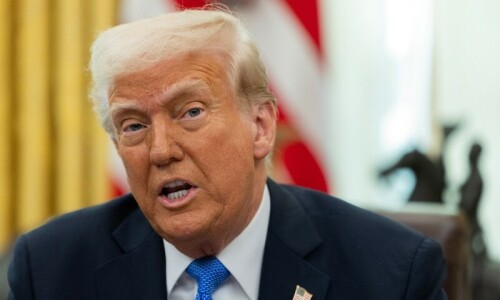KARACHI: In an effort to keep the beleaguered public transport system in the city afloat, the caretaker provincial government on Wednesday inducted 80 more buses — 30 diesel hybrid and 50 electric — to the fleet of the Peoples Bus Service (PBS), increasing the number to 300, including 19 women-only buses.
Though the addition of 80 more buses is fractional in the city that requires over 15,000 public buses, the commuters will heave a sigh of relief as the PBS buses operating on 11 routes in Karachi provide a standardised transport to a sizeable number of citizens.
The stunning shortfall of the public buses has already left the majority of people in the city with limited options, mainly auto-rickshaws and motorcycle riders, for their daily commutes out of sheer necessity.
The 80 buses — 30 hybrid and 50 electric — were added to the PBS fleet by caretaker Chief Minister retired Justice Maqbool in a simple ceremony held at Mazar-i-Quaid.
Caretaker CM Baqar says Karachi should have at least 15,000 buses
Karachi Mayor Murtaza Wahab, caretaker Information Minister Ahmad Shah and other members of the Sindh cabinet also attended the inauguration ceremony.
The CM cut the ribbon to inaugurate 30 hybrid and 50 electric buses. He along with other officials travelled on one of the buses for a brief journey.
Speaking on the occasion, the CM said as of mid-2015, there were 3.6 million registered vehicles in the city, which was over 30 per cent of the national total. He added that the growth rate for private vehicles was over four per cent, which meant that there were now over 1,000 new vehicles being added to the streets of the city each day.
He pointed out that until 2017 there were more than 12,000 public vehicles, including buses, minibuses and coaches, operating on 267 routes in the city. “However, the number of buses has been declining steadily, and as of 2017, less than 5,000 buses were serving fewer than 100 routes.”
He emphasised that a city as big as Karachi should have at least 15,000 modern buses.
The chief minister said that owing to the lack of intra-city public transport, the provincial government and the National Radio and Telecommunication Corporation (NRTC) signed an agreement in October 2021 for the supply, operation, and construction of the Sindh Intra-District Peoples Bus Service Project.
“It is a government-to-government (G2G) initiative launched in June 2022. It is the first-ever intra-city public transport project operating in mixed traffic, especially in Karachi and other cities of Sindh, such as Larkana, Hyderabad, and Sukkur.
“The project is designed to integrate state-of-the-art bus operations model consisting of high-quality diesel hybrid bus service to meet the increasing urban transport demand in metropolitan cities and contribute to the development of a sustainable transport system,” he added.
Briefing the CM, Transport Secretary Asad Zamin said that currently, 204 Buses were in operation on 11 routes in Karachi.
He said six buses were operating in Larkana, 12 in Hyderabad on two routes, and 10 in Sukkur.
He said that the first women-only Pink Buses project was already operating in the city.
50 electric buses
The CM was informed that the Telephone Industry of Pakistan (TIP), a subsidiary of the NRTC, was engaged in a flagship project with the Sindh government. It has submitted a proposal through its international partners to develop an eco-friendly ‘electric vehicle system’ in the province.
The initiative is on a ‘Rent to Own’ model under which the Sindh government would pay nominal lease payments, including the operational and capital costs, for eight years. After completion of the lease period the buses would be handed over to the provincial government.
The caretaker CM acknowledged that the proposal had been negotiated with sound terms and due diligence.
Justice Baqar directed the transport department to work out a robust contractual framework with the TIP to ensure maximum performance for public benefit.
He emphasised that the key performance indicators (KPIs) should ensure proper maintenance of buses throughout the eight years of the buyback period.
The caretaker cabinet had approved a pilot project comprising 50 environment-friendly pure electric buses to fulfil the previous commitments to formalise the contractual arrangements.
Published in Dawn, January 11th, 2024

















































